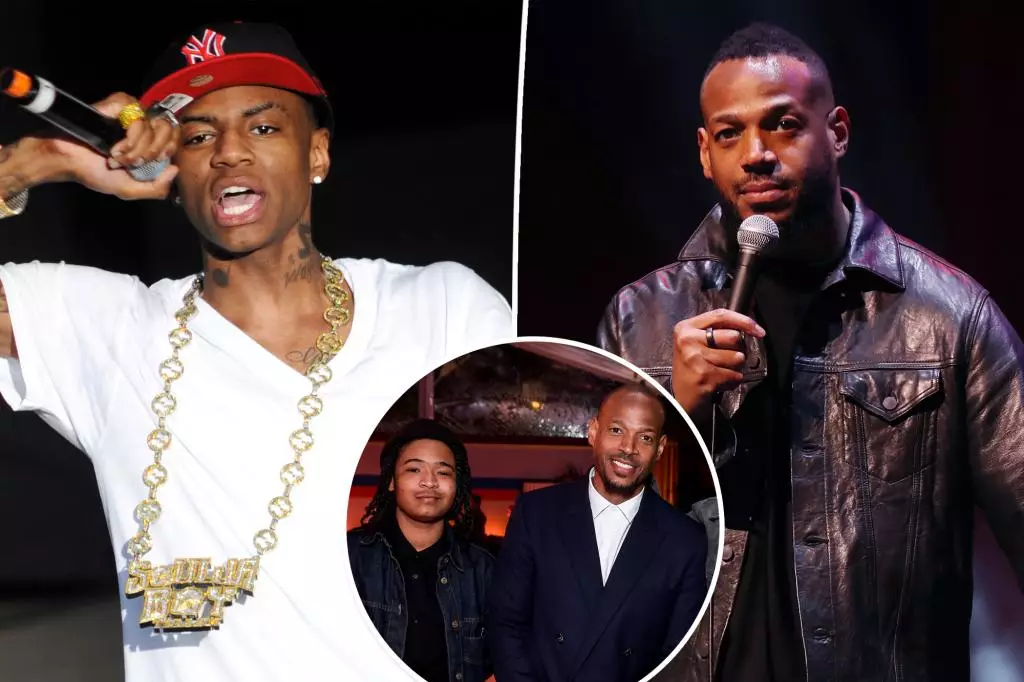In today’s media landscape, where celebrity conflicts often attract as much attention as the art they produce, recent encounters between actor Marlon Wayans and rapper Soulja Boy have ignited a heated debate. This feud, deeply rooted in personal issues and perceptions of identity, raises questions about art, public persona, and the societal responses to transgender identities. At the heart of the conflict is a poignant moment where Soulja Boy disparaged Wayans’ transgender son, leading to a fierce rebuttal from Wayans himself.
Wayans, a well-known figure in the comedy scene, has never shied away from controversial discussions, especially regarding family and support for the LGBTQ+ community. His son, once known as Amai, is now named Kai, reflecting his transition and the family’s evolving understanding of gender identity. In comments on social media, Wayans not only defended his son against Soulja Boy’s derogatory remarks but also emphasized the importance of unconditional love and acceptance. This public display of support is vital in a world where many still face discrimination and misunderstanding.
The situation escalated when Soulja Boy, utilizing his platform on social media, made derogatory comments about Wayans’ choice to embrace his son’s transgender identity. His use of slurs aimed at Wayans and his family not only demonstrates a lack of basic decency but also highlights the considerable challenges that come with being part of an oppressed community. Soulja Boy’s comments can be seen as a reflection of the societal attitudes that perpetuate stigma toward transgender individuals.
In response, Wayans highlighted the rapper’s waning relevance in the entertainment industry, asserting that had Soulja Boy maintained a strong career, such comments could have led to immediate backlash. This response is an intersection of personal defense and broader commentary on the stakes of public life in the age of social media. Wayans’ defense is not just about protecting his child’s identity; it is also about confronting the problematic culture of reinforcement of harmful stereotypes.
Wayans’ statements reveal a deeply personal journey, where he initially struggled with the idea of his child’s transition but ultimately found a place of acceptance. His evolution mirrors broader societal shifts regarding gender identity and transgender rights, reflecting how both public figures and the public at large must adapt to changing realities. This narrative is particularly significant as it showcases the power of parental love over prejudiced viewpoints—a narrative that resonates strongly with many families grappling with similar challenges.
Furthermore, Wayans’ public displays of support for Kai during important cultural events, such as Pride Month, serve to amplify the message of acceptance. His statements on social media, reinforced with humor and irreverence, underscore a commitment to championing LGBTQ+ rights while also sparking necessary conversations about identity and acceptance within the fabric of modern society.
Wayans’ wit and humor have been integral to his career. In addressing the feud with Soulja Boy, he utilized comedic elements that not only lighten the situation but also critique the absurdity of certain competitive dynamics in entertainment. During interviews, he compared Soulja Boy to a “wet muppet,” invoking powerful imagery and humor that transcended mere insult to provide a commentary on relevance and contribution to pop culture. This tactic serves a dual purpose: it dismantles the severe nature of the insults thrown while simultaneously establishing Wayans’ command over the conversation.
Ultimately, this exchange between Wayans and Soulja Boy illuminates the intersections of celebrity culture, family dynamics, and the ongoing fight for acceptance in society. It is a reflection of cultural tensions surrounding identity, and how, even amidst disparagement, love and a deep commitment to support can stand as a powerful rebuke against hate. As society continues to confront these issues head-on, the narratives established by public figures like Wayans offer both hope and a blueprint for acceptance and understanding in the face of adversity.
